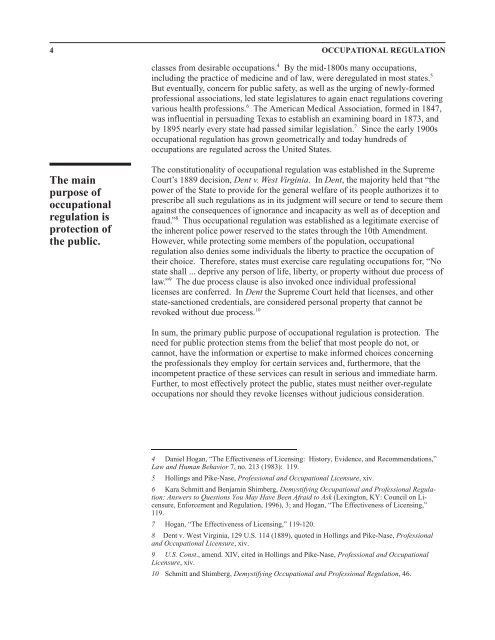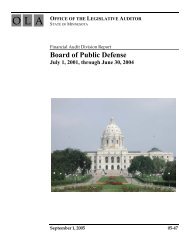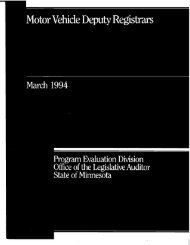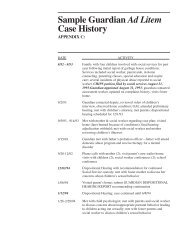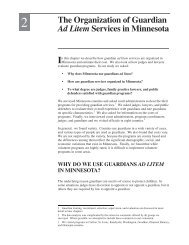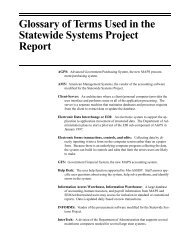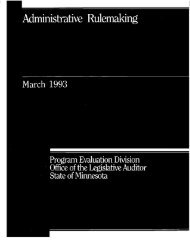Occupational Regulation - Office of the Legislative Auditor
Occupational Regulation - Office of the Legislative Auditor
Occupational Regulation - Office of the Legislative Auditor
You also want an ePaper? Increase the reach of your titles
YUMPU automatically turns print PDFs into web optimized ePapers that Google loves.
4 OCCUPATIONAL REGULATION<br />
classes from desirable occupations. 4 By <strong>the</strong> mid-1800s many occupations,<br />
including <strong>the</strong> practice <strong>of</strong> medicine and <strong>of</strong> law, were deregulated in most states. 5<br />
But eventually, concern for public safety, as well as <strong>the</strong> urging <strong>of</strong> newly-formed<br />
pr<strong>of</strong>essional associations, led state legislatures to again enact regulations covering<br />
various health pr<strong>of</strong>essions. 6 The American Medical Association, formed in 1847,<br />
was influential in persuading Texas to establish an examining board in 1873, and<br />
by 1895 nearly every state had passed similar legislation. 7 Since <strong>the</strong> early 1900s<br />
occupational regulation has grown geometrically and today hundreds <strong>of</strong><br />
occupations are regulated across <strong>the</strong> United States.<br />
The main<br />
purpose <strong>of</strong><br />
occupational<br />
regulation is<br />
protection <strong>of</strong><br />
<strong>the</strong> public.<br />
The constitutionality <strong>of</strong> occupational regulation was established in <strong>the</strong> Supreme<br />
Court’s 1889 decision, Dent v. West Virginia. InDent, <strong>the</strong> majority held that “<strong>the</strong><br />
power <strong>of</strong> <strong>the</strong> State to provide for <strong>the</strong> general welfare <strong>of</strong> its people authorizes it to<br />
prescribe all such regulations as in its judgment will secure or tend to secure <strong>the</strong>m<br />
against <strong>the</strong> consequences <strong>of</strong> ignorance and incapacity as well as <strong>of</strong> deception and<br />
fraud.” 8 Thus occupational regulation was established as a legitimate exercise <strong>of</strong><br />
<strong>the</strong> inherent police power reserved to <strong>the</strong> states through <strong>the</strong> 10th Amendment.<br />
However, while protecting some members <strong>of</strong> <strong>the</strong> population, occupational<br />
regulation also denies some individuals <strong>the</strong> liberty to practice <strong>the</strong> occupation <strong>of</strong><br />
<strong>the</strong>ir choice. Therefore, states must exercise care regulating occupations for, “No<br />
state shall ... deprive any person <strong>of</strong> life, liberty, or property without due process <strong>of</strong><br />
law.” 9 The due process clause is also invoked once individual pr<strong>of</strong>essional<br />
licenses are conferred. In Dent <strong>the</strong> Supreme Court held that licenses, and o<strong>the</strong>r<br />
state-sanctioned credentials, are considered personal property that cannot be<br />
revoked without due process. 10<br />
In sum, <strong>the</strong> primary public purpose <strong>of</strong> occupational regulation is protection. The<br />
need for public protection stems from <strong>the</strong> belief that most people do not, or<br />
cannot, have <strong>the</strong> information or expertise to make informed choices concerning<br />
<strong>the</strong> pr<strong>of</strong>essionals <strong>the</strong>y employ for certain services and, fur<strong>the</strong>rmore, that <strong>the</strong><br />
incompetent practice <strong>of</strong> <strong>the</strong>se services can result in serious and immediate harm.<br />
Fur<strong>the</strong>r, to most effectively protect <strong>the</strong> public, states must nei<strong>the</strong>r over-regulate<br />
occupations nor should <strong>the</strong>y revoke licenses without judicious consideration.<br />
4 Daniel Hogan, “The Effectiveness <strong>of</strong> Licensing: History, Evidence, and Recommendations,”<br />
Law and Human Behavior 7, no. 213 (1983): 119.<br />
5 Hollings and Pike-Nase, Pr<strong>of</strong>essional and <strong>Occupational</strong> Licensure, xiv.<br />
6 Kara Schmitt and Benjamin Shimberg, Demystifying <strong>Occupational</strong> and Pr<strong>of</strong>essional <strong>Regulation</strong>:<br />
Answers to Questions You May Have Been Afraid to Ask (Lexington, KY: Council on Licensure,<br />
Enforcement and <strong>Regulation</strong>, 1996), 3; and Hogan, “The Effectiveness <strong>of</strong> Licensing,”<br />
119.<br />
7 Hogan, “The Effectiveness <strong>of</strong> Licensing,” 119-120.<br />
8 Dent v. West Virginia, 129 U.S. 114 (1889), quoted in Hollings and Pike-Nase, Pr<strong>of</strong>essional<br />
and <strong>Occupational</strong> Licensure, xiv.<br />
9 U.S. Const., amend. XIV, cited in Hollings and Pike-Nase, Pr<strong>of</strong>essional and <strong>Occupational</strong><br />
Licensure, xiv.<br />
10 Schmitt and Shimberg, Demystifying <strong>Occupational</strong> and Pr<strong>of</strong>essional <strong>Regulation</strong>, 46.


